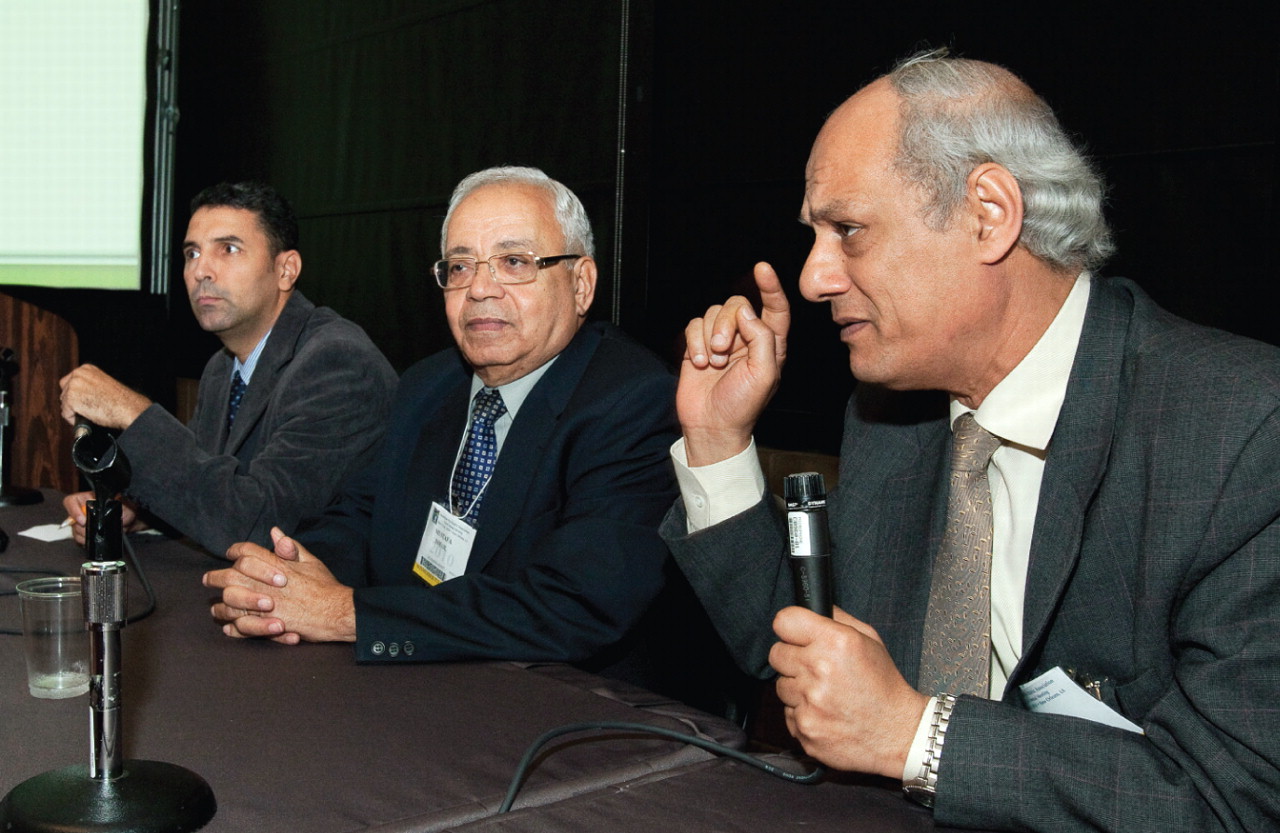Mid-East Psychiatrists Explore Mind of Suicide Bombers
Abstract
Suicidal bombing differs from ordinary suicide because the primary goal of the person carrying the explosives is not just to die, but rather to accomplish a mission in the process, Yasser Elsayed, M.D., told a packed room at the APA annual meeting in New Orleans in May.
“They are human bombs, not suicide bombers,” said Elsayed, a professor of psychiatry at the Institute of Psychiatry at Ain Shams University in Cairo. The bombers resort to suicide through an absence of other choices, believing that their behavior is a form of martyrdom in service of a higher cause.
Elsayed was one of three speakers on a panel discussing the psychology of suicide bombing.

Psychiatrists Yasser Elsayed, M.D., Mostafa Ismail, M.D., and Mohsen Khalil, M.D., argue that suicide bombers may be extraordinarily committed to a political or religious cause but are not psychopathological.
One might assume that people recruited to be bombers would exhibit some psychopathology, but that is not the case, at least in a clinical sense, said Mohsen Khalil, M.D., of the Al-Amal Complex for Mental Health in the Ministry of Health of Saudi Arabia.
“Studies have shown that there are no distinctive psychological traits shared by suicide bombers,” he said. “Many are smart, successful, sociable, young, male, single.”
They are convinced to act by some perceived injustice in their community, but they are not psychopathological, he said. Their frustration leaves them vulnerable to brain-washing at the hands of recruiters looking for human bomb-delivery vehicles, he said.
Suicide bombing is not an impulsive, individual act; it is less about individual dynamics than group dynamics. Individuals are needed to perpetrate such bombings, but 95 percent of bombings are planned and carried out by organizations, supported by their surrounding communities.
The bombers may be seen as “altruistic” in the sense that it means sacrificing one's ego to a greater cause, said Khalil. The cause is generally political or religious, characterized by perceived injustice and frustration with conventional means for change, he said.
Suicide bombers feel honor and pride but not guilt, he noted. They may hate their victims or have no feelings toward them, but their intention is to produce a political effect rather than merely kill people. In that sense, “the victim is never the target, and the target is never the victim.”
The speakers referred to analyses by American political scientist Robert Pape concluding that contemporary suicide bombers are characterized by four D's: deprivation (of political rights or through foreign occupation); deception (in how they are recruited and prepared by others); devotion (to a national or religious cause); and death (the conversion of death into a “meaningful” life).
“Any society has a minority of disaffected groups who have a sense of injustice and persecution,” said Mostafa Ismail, M.D., a professor at the Institute of Psychiatry at Ain Shams.
While Americans may associate suicide bombing with Islamic fundamentalism, the tactic was largely initiated by the Tamil Tiger rebels in Sri Lanka, who accounted for 76 of the 315 suicide bomb attacks between 1980 and 2003, according to Pape's research.
Furthermore, Islam formally opposes killing civilians, even in war, and prohibits suicide for any reason, said Elsayed. Even attempted suicide is a crime under Islamic law. And while all Western societies may oppose suicide bombing, they too glorify the sacrifice in war of one to save many, he stated.
Ismail noted that he and his two colleagues were mental health professionals, not politicians. “We are all against terrorizing, killing, or threatening innocent civilians,” he said. “These are unusual and unnatural acts.”
Psychiatrists and mental health professionals have a limited role in diverting potential suicide bombers from the path they have chosen. Such interventions occur rarely, usually after bomb plots are interrupted by police or if bombers are captured after their bombs fail to explode. “We must bring them back to their senses,” said Elsayed.
Officials in Saudi Arabia say that a rehabilitation program there for captured “militants” or “terrorists” (but not specifically for suicide bombers), appears to be working, he said. The program includes religious re-education by clerics, art therapy, sports, and financial help to start a new life.
However, researchers do not have full access to data that would permit analysis of the program's success, and there are no clinical studies on actual terrorists, said Elsayed.
Indeed, observed one member of the audience in the discussion that followed, “Suicide bombers never present for treatment.”
Governments might do more to investigate the psychology of suicide bombers by organizing teams of psychiatrists, social workers, clergy, and politicians to study the problems. Elsayed said, “A lot could be done with 1 percent of the military budget.” 



